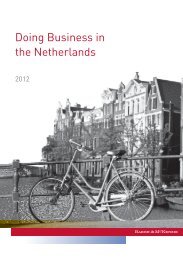912.025 AmCham News [1] - American Chamber of Commerce in ...
912.025 AmCham News [1] - American Chamber of Commerce in ...
912.025 AmCham News [1] - American Chamber of Commerce in ...
- TAGS
- amcham
- commerce
- www.amcham.nl
Create successful ePaper yourself
Turn your PDF publications into a flip-book with our unique Google optimized e-Paper software.
CHAMBERNEWS<br />
The European Discount?<br />
Last February 22 an <strong>AmCham</strong> sem<strong>in</strong>ar was hosted by House <strong>of</strong> F<strong>in</strong>ancials <strong>in</strong> their attractive location <strong>in</strong> Oegstgeest.<br />
Speaker was Arthur Docters van Leeuwen – the chairman <strong>of</strong> the Netherlands Authority for the F<strong>in</strong>ancial Markets<br />
(AFM). It was a full house with a wait<strong>in</strong>g list <strong>of</strong> <strong>in</strong>terested members.<br />
Supervisory Convergence <strong>in</strong> Europe<br />
The AFM supervises the conduct <strong>of</strong> all<br />
parties active <strong>in</strong> the fi nancial markets –<br />
securities <strong>in</strong>stitutions, collective <strong>in</strong>vestment<br />
schemes, securities exchange<br />
trad<strong>in</strong>g, <strong>in</strong>termediaries and, before this<br />
year’s end, auditors. Most <strong>of</strong> its tasks –<br />
some 95 percent – are a result <strong>of</strong> new, EU<br />
directives. The AFM is, therefore, not a<br />
purely national phenomenon but part <strong>of</strong> a<br />
wider EU network with<strong>in</strong> the Committee<br />
<strong>of</strong> European Security Regulators (CESR).<br />
What applies on a small scale to the<br />
Dutch market applies on a large scale to<br />
the European Union.<br />
It has been said that there is a Dutch discount<br />
on certa<strong>in</strong> markets as a result <strong>of</strong><br />
various circumstances that make it more<br />
diffi cult for an outsider to ga<strong>in</strong> access<br />
to this market. In Docters van Leeuwen’s<br />
op<strong>in</strong>ion we must work to prevent a<br />
European discount that might reduce the<br />
attractiveness and accessibility <strong>of</strong> fi nancial<br />
players <strong>in</strong> the EU market. Just as good<br />
market supervision <strong>in</strong> the Netherlands<br />
has proven to be a remedy aga<strong>in</strong>st the<br />
market’s bad name here, properly organized<br />
supervision <strong>in</strong> the EU should contribute<br />
to a transparent European market.<br />
This is necessary if the European fi nancial<br />
markets are to compete effectively with<br />
the <strong>American</strong> and Asian fi nancial markets.<br />
The course for action here has been laid<br />
out <strong>in</strong> the EU’s F<strong>in</strong>ancial Services Action<br />
Plan <strong>in</strong>troduced <strong>in</strong> 1999. The action plan<br />
for a s<strong>in</strong>gle fi nancial market puts forward<br />
<strong>in</strong>dicative priorities and a timetable for<br />
specifi c measures to achieve three strategic<br />
objectives, namely establish<strong>in</strong>g a s<strong>in</strong>gle<br />
market <strong>in</strong> wholesale fi nancial services;<br />
mak<strong>in</strong>g retail markets open and secure<br />
and strengthen<strong>in</strong>g the rules on prudential<br />
supervision.<br />
A S<strong>in</strong>gle Market <strong>in</strong> fi nancial services has<br />
long been an EU objective. The <strong>in</strong>tegration<br />
<strong>of</strong> fi nancial markets <strong>in</strong> the EU has<br />
progressed much further <strong>in</strong> wholesale<br />
than <strong>in</strong> retail fi nancial services, with the<br />
latter still segmented largely along national<br />
l<strong>in</strong>es. The F<strong>in</strong>ancial Services Action<br />
Plan consists <strong>of</strong> a set <strong>of</strong> measures <strong>in</strong>tended<br />
by 2005 to fi ll gaps and remove the rema<strong>in</strong><strong>in</strong>g<br />
barriers to a S<strong>in</strong>gle Market <strong>in</strong><br />
fi nancial services across the EU as a<br />
whole.<br />
The forty plus measures which are part <strong>of</strong><br />
F<strong>in</strong>ancial Services Action Plan, if properly<br />
implemented and enforced <strong>in</strong> a coord<strong>in</strong>ated<br />
way, is the legal architecture <strong>of</strong> the<br />
EU s<strong>in</strong>gle market for fi nancial services.<br />
The majority <strong>of</strong> these measures have been<br />
created over the last few years and have<br />
kept the CESR busy <strong>in</strong> its role as <strong>of</strong>fi cial<br />
advisor to the European Commission.<br />
The complete speech <strong>of</strong> Arthur Docters<br />
van Leeuwen is on the website <strong>of</strong> the AFM<br />
– www.afm.nl . <strong>AmCham</strong> expresses its<br />
thanks to House <strong>of</strong> F<strong>in</strong>ancials for their cooperation<br />
<strong>in</strong> this event.<br />
GDP as a Measure <strong>of</strong> Well-Be<strong>in</strong>g<br />
GDP per head is the most commonly used measure <strong>of</strong> a country’s success, yet it is badly fl awed as<br />
a guide to a nation’s economic well-be<strong>in</strong>g. A new study <strong>in</strong> the OECD’S 2006 Go<strong>in</strong>g for Growth report<br />
considers some alternatives.<br />
Economists spend much time discuss<strong>in</strong>g<br />
how to boost GDP growth. The OECD itself<br />
drew attention recently to the widen<strong>in</strong>g<br />
gap between America’s and Europe’s<br />
GDP per head. Yet a nation’s well-be<strong>in</strong>g<br />
depends on many factors ignored by GDP,<br />
such as leisure time, <strong>in</strong>come <strong>in</strong>equality<br />
and the quality <strong>of</strong> the environment. GDP<br />
was developed primarily as a plann<strong>in</strong>g<br />
tool to guide the huge production effort<br />
<strong>of</strong> the second world war. It was never <strong>in</strong>tended<br />
to be the defi nitive yardstick <strong>of</strong><br />
economic welfare. Would another <strong>in</strong>dicator<br />
change the rank<strong>in</strong>g <strong>of</strong> countries or<br />
their relative performance over time?<br />
The OECD has made a brave attempt to<br />
adjust GDP for the distribution <strong>of</strong> <strong>in</strong>come.<br />
To most observers, a country where a few<br />
families enjoy huge wealth but most live<br />
<strong>in</strong> abject poverty would have a lower level<br />
<strong>of</strong> well-be<strong>in</strong>g than one with the same GDP<br />
but less poverty. A dollar <strong>of</strong> <strong>in</strong>come is, <strong>in</strong><br />
effect, worth more <strong>in</strong> the hands <strong>of</strong> the<br />
poor—though just how much more depends<br />
on attitudes towards <strong>in</strong>equality.<br />
The OECD’s calculations suggest if people<br />
strongly dislike <strong>in</strong>equality, the gap between<br />
America and most other rich<br />
countries, which have a more equal distribution<br />
<strong>of</strong> <strong>in</strong>come, should be greatly reduced<br />
(see chart). By this measure,<br />
adjusted <strong>in</strong>come per head is higher <strong>in</strong><br />
France than <strong>in</strong> America.<br />
Longer holidays and shorter work<strong>in</strong>g<br />
hours <strong>in</strong>crease an <strong>in</strong>dividual’s well-be<strong>in</strong>g,<br />
yet conventional national accounts com-<br />
pletely overlook such benefi ts. America is<br />
one <strong>of</strong> the world’s richest countries, yet<br />
its workers toil longer hours than many<br />
elsewhere. As a result, adjust<strong>in</strong>g GDP for<br />
leisure also narrows the gap between<br />
America and Europe. The OECD uses<br />
three different methods to place a value<br />
on leisure. Us<strong>in</strong>g the highest valuation<br />
(based on average GDP per hour worked),<br />
Germany’s leisure-adjusted GDP per head<br />
is only 6% lower than America’s, compared<br />
with a 26% shortfall <strong>in</strong> conventional<br />
GDP per head. The Netherlands<br />
leisure-adjusted GDP is more than 10%<br />
higher than America’s. Most European<br />
countries’ leisure-adjusted GDP has<br />
grown faster than the standard measure<br />
over the past few decades, as hours<br />
worked have decl<strong>in</strong>ed.<br />
GDP is clearly not the best <strong>in</strong>dicator <strong>of</strong><br />
well-be<strong>in</strong>g, but the OECD concludes that<br />
for most purposes it is the best that is<br />
FAIR PLAY<br />
available on a timely basis. However, GDP<br />
needs to be complemented by other measures<br />
to give a fuller picture. The OECD<br />
takes comfort from the fact that most alternative<br />
measures yield similar <strong>in</strong>ternational<br />
rank<strong>in</strong>gs to GDP per head. It is true<br />
that neither the adjustment for <strong>in</strong>equality<br />
nor that for leisure alone overturns<br />
America’s economic superiority. However,<br />
if both adjustments were made, then on<br />
certa<strong>in</strong> assumptions, the gap between the<br />
United States and several European countries<br />
could vanish.<br />
This does not mean that Europe can afford<br />
to abandon economic reforms.<br />
Leisure time is valuable, but it will not pay<br />
for future pensions. Nevertheless, the<br />
OECD is to be congratulated for be<strong>in</strong>g the<br />
fi rst ma<strong>in</strong>stream organization to challenge<br />
the conventional GDP numbers. Its<br />
task now is to encourage governments to<br />
start produc<strong>in</strong>g more relevant statistics.<br />
4 <strong>AmCham</strong><strong>News</strong> March 2006<br />
<strong>AmCham</strong><strong>News</strong> March 2006 5<br />
120<br />
110<br />
100<br />
90<br />
80<br />
70<br />
60<br />
50<br />
Netherlands<br />
France<br />
Brita<strong>in</strong><br />
Germany<br />
Sweden<br />
Canada<br />
Australia<br />
Italy<br />
Japan<br />
Spa<strong>in</strong><br />
ETCETERA<br />
GDP per head<br />
adjusted for leisure<br />
Household <strong>in</strong>come<br />
adjusted for <strong>in</strong>equality<br />
GDP per head at<br />
purchas<strong>in</strong>g-power<br />
parity, 2002 (Valued at<br />
GDP per hour worked)<br />
United States = 100


![912.025 AmCham News [1] - American Chamber of Commerce in ...](https://img.yumpu.com/9328612/3/500x640/912025-amcham-news-1-american-chamber-of-commerce-in-.jpg)




